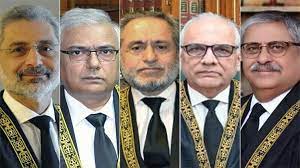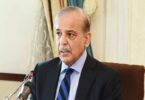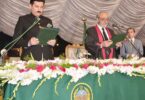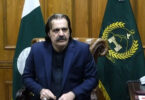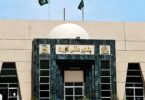F.P. Report
ISLAMABAD: The Supreme Court has issued notice to PTI Chairman Imran Khan while hearing an intra-court appeal filed by the federal government against the SC verdict that struck down changes in the NAB law.
The court hearing started at 11:30 a.m. A five-judge larger bench headed by Chief Justice of Pakistan, Justice Qazi Faez Isa heard the intra-court appeal on Tuesday.
The other members of the bench included: Justice Aminuddin Khan, Justice Jamal Khan Mandokhel, Justice Athar Minallah and Justice Hassan Azhar Rizvi.
During the hearing, the Chief Justice of Pakistan remarked that other applications have also been filed in this case. Zohair Ahmed Siddiqui and Khawaja Haris have filed an application.
Lawyer Farooq H Naek requested the court to suspend the decision of the NAB amendments case. On which, the Chief Justice remarked that he would not suspend the SC decision in the NAB amendments case. He said that he could only direct the accountability courts not to make final decisions.
The top judge said that the court would decide the appeal against the NAB amendments after the detailed decision of the SC (Practice and Procedure Act) case.
After that, the Supreme Court issued notices to the petitioner PTI Chairman in the case.
It also issued notices to the NAB, Islamabad and other parties including the provincial advocate generals.
The apex court restrained the NAB courts from making final decisions in the pending cases till the SC decision on the intra-court appeal.
The hearing of the case was postponed for an indefinite period.
The court also directed to provide copies of the court orders and appeals to the PTI chairman in jail.
Govt seeks deferment of its appeal
Earlier, the federal government requested the Supreme Court to defer the hearing of its intra-court appeal against the SC verdict in the NAB amendments case, pleading non-availability of its lawyer.
The federal government on Tuesday filed a miscellaneous petition seeking postponement of the court proceedings scheduled to be started at 11:30 a.m. today.
The federal government prayed in the petition that its lawyer Makhdoom Ali Khan went to Paris on Oct 27 and he would be back on Nov 4. It further stated that the government came to know about the fixing of the case hearing on Oct 28, a day after its lawyer left for Europe.
Today’s hearing
At the outset of the hearing, Attorney General for Pakistan Mansoor Usman Awan said that lawyer Makhdoom Ali Khan has been appointed as a lawyer by the federal government.
He said that Makhdoom was the lawyer in both the original case and the appeal, so the request for adjournment of the case was made by Makhdoom Ali Khan.
The Chief Justice remarked that there are some other applications in the case.
Advocate Farooq H Naek appeared on behalf of petitioner Zohair Siddiqui.
Naek said, “My client, affected by the Supreme Court’s majority decision, has filed an application to join the case. As a result of the amendments, my client’s case was reopened, I should also be made a party in the case, the court gave a decision without hearing us, we are opposing the decision.”
The Chief Justice remarked that the dissenting note of Justice Mansoor Ali Shah has also come, the petitioner can amend the petition after the dissenting note if he wants and the hearing is open till review, if you file a review petition then we will not hear the intra-court appeal.
Naek said that he wants to withdraw the review petitions.
While talking to Makhdoom Ali Khan’s assistant counsel, the Chief Justice asked if he was using the Attorney General’s office as a shield, to which the assistant counsel said that it was not so.
The Chief Justice remarked ‘If we look at the merits under Practice and Procedure, the appeals will be restored, should we not wait for the detailed decision of the Practice and Procedure case?’
Naek said that if the detailed verdict is waited for, it would cause delay, the five-member larger bench should proceed with the case without delay.
The Chief Justice remarked that now the Practice and Procedure Law has come into force, should we not wait for the detailed decision of the Practice and Procedure, the right to appeal against the decision has been given under Clause 3 of Article 184.
Justice Athar Minallah remarked that this case is for interpretation. How is the federal government the affected party in this case? The word “person” who is affected can appeal in the Practice and Procedure Law, the judge said.
‘No one acquitted of charges by NAB amendments’
The Chief Justice remarked that everything has not been abolished by the NAB amendments, only the forum has been changed by the NAB amendments. No one has been acquitted of charges by the NAB amendments. Farooq H. Naek said that now the decision affects his right to go to NAB court again.
The Attorney General said that the Federation is affected and therefore has filed an appeal. The Chief Justice said in his remarks that the court would hear the intra-court appeal against NAB law changes after the detailed decision of the Practice and Procedure Law.
Naek requested that the Supreme Court should suspend the NAB amendments verdict because the NAB courts could hand down punishments in cases.
The Chief Justice remarked: “We have ordered that the NAB courts should not take a final decision until the Supreme Court’s decision.”
The Attorney General said that the Supreme Court should suspend the NAB amendment decision, because the NAB amendments have become law and they are defending it.
Justice Athar Minallah remarked how the First and Second Amendments could be declared invalid without examining the Third Amendment.
The Chief Justice remarked that a five-member bench should have heard the NAB amendments case in the light of Practice and Procedure Law.
Farooq Naek argued that the third amendment was not tampered with in the NAB Law.
The Chief Justice remarked ‘give us the details, how many amendments to the NAB Act have been declared invalid and how many amendments are still in force’.
Justice Minallah remarked that how some amendments could be declared null and void unless all the amendments are seen together. The Chief Justice remarked that one amendment made in the NAB Act is linked to another.
During the hearing, when the name of the Chief Justice was mentioned, the Chief Justice made important remarks that now it is not the Chief Justice, but now there are judges.
The CJP said that he has agreed with the observation of Justice Minallah. “All three amendments to the NAB laws are linked together. Even after the third amendment to the law, six more amendments were made in five months and I am quite surprised at this legal point,” Chief Justice Isa observed.
The top judge went on to say ‘if the decision had been reserved before the third amendment in the NAB law, it would have been a different matter, but even after the third amendment to the NAB law, six hearings were held, we should give very clear instructions to the trial court judges, in such a case a decision should have been made on the third amendment’.
Justice Minallah remarked that the Practice and Procedure Bill was suspended but the Act was never suspended.
The Chief Justice remarked that the detailed decision of the Practice and Procedure Act case is yet to come and there is a possibility that the judgment may contain a decision on this point as well. “Keeping this thing in mind, we cannot proceed with the case today. Is evidence recorded in a trial court admissible in another court in case the legal forum has been changed? Not wanting to burden the trial court judge with interpretations, the trial court judge should restrict himself only to the trial, he added.
After that, the Chief Justice started writing the order.
It was written in the ruling that the court was told that under Clause 4 of the Practice and Procedure Law, where there is a matter of constitutional interpretation, less than 5 judges cannot hear the case and it was said that the Practice and Procedure Law was made in accordance with the Constitution. Makhdoom Ali Khan’s assistant counsel Saad Hashmi said that the Supreme Court has declared the Practice and Procedure Law valid.
The ruling said that it is appropriate that after the detailed decision of the Practice and Procedure Law, the intra-court appeal against NAB amendments should be set for hearing.
Background
On September 15, the Supreme Court led by then Chief Justice Umar Ata Bandial in a majority 2-3 verdict declared some amendments to the National Accountability Ordinance (NAO) null and void and revived corruption cases against public office holders that were withdrawn after amendments were made to the country’s accountability laws.
However, the federal government filed an intra-court appeal against the SC decision two weeks ago through senior lawyer Makhdoom Ali Khan. The government sought 15 days’ time to file additional documents with a plea that the majority decision was against the facts of the case and contrary to the law.
Justice Shah’s dissenting note
Yesterday, Justice Mansoor Ali Shah, who had disagreed with the apex court’s verdict on the petition filed against amendments made to the National Accountability Ordinance (NAO) 1999 by parliament, released his 27-page dissenting note.
In his note, Justice Shah categorically said that the judiciary could not interfere in the internal affairs of the parliament and that the courts could only scrutinize any legislation when it was contradictory to fundamental human rights.
The judge was of the view that scrutinizing any law under the impression that the lawmakers might have enacted it to serve their vested interests amounted to an ‘insult’ to parliament as well as democracy.
Defending his right to dissent, he argued that the judge disagreeing with the majority view was not swayed by the opinion of a mob, but he had his eyes set on the future. “Courts don’t have to follow the popular political narrative,” he said, adding, “Instead courts have to give decisions as per the constitution even if it means going against the public opinion.”
Going one step forward, Justice Shah went on to say that nobody even had the right to challenge any bill passed by the parliament. “In a democracy, it is the majority view which holds sway,” he opined.
He further said that if a law had been enacted by a majority of parliamentarians, it meant that the entire parliament had enacted it.
Courtesy: (24news)

